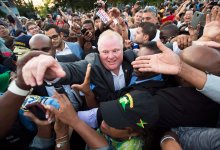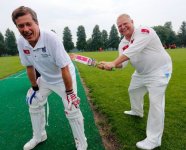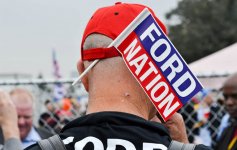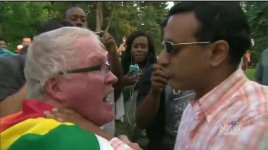When a controversial figure passes away, there is inevitably an effort to downplay the negative aspects of what made them who they are. This is a problem, because when someone as controversial as Rob Ford dies, we lose the opportunity to discuss who they really were, and to fairly evaluate their impact. In the case of Rob Ford, who always valued honesty over manners, this matters. Because Rob Ford was loathed, by a great many people, and not out of a fit of pique.
This legacy deserves to be understood and remembered.
Rob Ford was the most important and impactful person to operate in Toronto politics for decades, and most of what he did was wrongheaded, ignorant or both; at his worst he could be outright malicious. He was not simply a clown, although he could and would play the clown, sometimes quite willingly. Nor was he simply an addict struggling with a terrible disease. He was, in fact, quite complicated, as close to a total embodiment of the great problem with modern politics as one could imagine.
Faced with the complexity that makes a large governmental body run, many people throw their hands up in the air and dismiss politics altogether as an irrelevancy, regardless of the fact that large chunks of their lives are dictated by what politicians decide. This drives down public engagement with politics; it drives down voter turnout; it depresses our collective civic knowledge, and debases our discourse. It creates people who decide that the problem with politics is that people make it needlessly difficult.
Rob Ford combined this lack of civic knowledge with hungry political ambition to create the absolute worst kind of politician. He relentlessly celebrated his own civic ignorance and did so at the expense of others.
20121126 RobFordOut DROSTphoto 045
Photo by Christopher Drost
“If you are not doing needles and you are not gay, you won’t get AIDS probably. That’s bottom line.” That was Rob Ford in 2006, voting against anti-AIDS education programs. When it was pointed out to him that the demographic where HIV infection was growing most quickly was heterosexual women, he responded by saying, “How are women getting it? Maybe they are sleeping with bisexual men.” That was the man in a nutshell: it didn’t matter what the actual facts were. He knew his own mind, and prioritized it over anything that might contradict it, no matter the facts.
We are, after all, talking about a man who made clear that he didn’t understand the difference between streetcars and light rail, or the difference between light rail running on streets or light rail running off of them, in a debate about those issues. When Josh Matlow (Ward 22, St. Paul’s) pushed him on the subject, and tried to help him understand that the light rail line Rob Ford opposed, ostensibly because it would tie up traffic, wasn’t actually going to run on streets, Ford resisted. He relied on what he knew in his heart: that people who talked to him wanted subways, subways, subways, that said subways are faster than light rail, that the St. Clair streetcar line took forever to get built and caused traffic problems, and subways, unlike the alternatives, are an “investment.” People referred to these utterances as talking points, but that phrase connotes a cynicism that is unfair to him. He believed these things with a fervour bordering on religious faith. They were his mantras.
ford fest 2012 nancy paiva 13
Photo by Nancy Paiva from Ford Fest 2012.
His near-total lack of knowledge about the job he was supposed to do is not debatable. Bear in mind that, when Rob Ford’s conflict of interest case went before the courts, his defense was that he had no idea he had done anything wrong because he had never read the councillor’s rules handbook (despite holding municipal political office for a dozen years by that point). Instead, he offered his own creative and completely wrong idea of what constituted a conflict of interest—after having been warned multiple times that he was in a conflict and should not speak, and did so anyway. He really did think that he had reduced the city’s planned debt (he did not), and saved the city a billion dollars (he did not), and that he had spearheaded policies which lowered unemployment (it increased over his watch), and that there was a crisis of wasteful spending at city hall (KPMG audited the city and found very little).
Rob Ford thought he was fighting the good fight; after all, he was legendarily available to his constituents and made a point to return every voicemail when he couldn’t answer directly. To him, time spent shovelling a constituent’s walk or helping them remove a fallen tree was the highest form of public service, and it was this sort of act that the people who loved him would point to as proof of his dedication. If there is a first tragedy in Rob Ford’s life, it is that he would have made a fine landlord or service worker. But he was ultimately a poor public servant, choosing to do what he loved instead of learning to do what was needed.
Toronto Mayor Rob Ford Skips Court for Football
Photo by Christopher Drost.
However, this sort of behaviour only accounts for some of his lies, and not all. There was a second sort of lying Rob Ford engaged in frequently: the lies he would tell to cover his ass. These lies were nastier. Over the years an identifiable pattern emerged. Rob Ford would do something bad, sometime because he was drunk or high. He would lie about having done it. He would get insulted when it became patently obvious that he was lying. And, eventually, he would come clean and admit the truth. Depending on the severity of what he had done, he would show remorse for his actions—or, much of the time, he would not.
In between the beginning and end of every Rob Ford scandal came the attacks on those he felt had wronged him. He had to apologize after a defamation case was brought against him when, in an interview with Conrad Black on Zoomer TV, he lied about Toronto Star reporter Daniel Dale when he suggested the respected reporter was a peeping tom or pedophile. He complained of a “hatchet job” by the media the first time he got kicked out of the Air Canada Centre for being drunk and rowdy at a Leafs game. When he was intoxicated at the Garrison Ball in 2013, he accused both Paul Ainslie (Ward 43, Scarborough East) and the Star of lying about his sobriety. He threatened staffers with defamation lawsuits for making statements to the police about his behaviour. When he finally admitted to smoking crack cocaine, he claimed that he had not been lying for six months; he instead blamed the press, saying that they “didn’t ask the right questions.”
20130128rob doug ford radio recap
When he wasn’t lying, he was hiding. Practically from the start of his mayoralty he refused to give the press his daily schedule—perhaps because he arrived dramatically late to work so often, frequently arriving after noon. He repeatedly skipped city council meetings to go coach the Don Bosco high school football team. And, like clockwork, whenever a fresh scandal broke, his children would suddenly have a Visit Daddy at Work Day, and Ford would push off any media questions about his latest misadventure by complaining that they were being insensitive to his children’s presence.
At the end of every scandal came the fresh realization that he wasn’t going to change. Rob Ford was a rich man’s son, and spent most of his life insulated from consequences which might trouble others. There is a good chance he repeatedly drove while drunk during his mayoral term—at the very least, his former chief of staff, Mark Towhey, instructed other staffers not to ride in the mayor’s car. When sober, he repeatedly demonstrated that he was a reckless driver in any event, driving while reading on the Gardiner or passing open streetcar doors. He racked up numerous conflict of interest concerns during his tenure and dismissed all of them with the same facile, self-interested definition of “conflict of interest.” The powerful men of Ontario had his back, for he was the son of a respected and popular Conservative backbench MPP, and he was not a man inclined to learn life lessons. And very few men rack up the number of domestic incident police visits that Rob Ford did without any serious consequence to their lives.
Certainly he never learned how damaging his homophobia was. Ford disliked Toronto’s queer community intensely, and made this obvious. He refused to attend Pride parades and most PFLAG flag raisings, first inventing excuses and then finally admitting he just didn’t want to go. He turned his attempt to remove a Pride flag during the Sochi Olympics—raised in protest of Russia’s persecution of gays—into a campaign plank. He cast the lone vote against an LGBTQ shelter. His dislike for the LGTBQ community was so pronounced that when City Council applauded the success of World Pride and the city staffers who had made it possible in 2014, Rob Ford petulantly refused to applaud or even stand. LGBTQ Torontonians spent four years with a Mayor who, at every possible opportunity, did his best to treat them like second-class citizens, and whose worst impulses were only curtailed by the rest of Council.
Most of Rob Ford’s other prejudices were relatively low-key. He referred to Asians as “Orientals” and explained that they “work like dogs”; he spoke in Jamaican patois during one of his drunken stupors; he referred to gang-prevention policies as “hug-a-thug” programs; he used terms like “wop,” “gino boy,” and “dago.” Certainly all of this was racist, but some of it was not pernicious anti-minority hatred; instead, he indulged in stereotypes (often positive ones, although they were no less racist for that) and racial shorthand. It was of a kind with most of his analytical thinking, and his minority constituents didn’t care because they knew there was no malice in his heart for them. He made the effort to reach out to their communities, which many city councillors never did. This is the second tragedy of Ford’s life: he truly could have made a difference for Toronto’s low income minority neighbourhoods, had he only understood the need for the type of work involved.
In that, and in so many other things, Ford harmed Toronto greatly, and not in the sense that our public image was diminished. Outside of Toronto he was only ever an amusing curiosity, fodder for the rest of the Toronto-hating country to make jokes, and for Americans to gawk a little in between late night talk show jabs. But Toronto is still the same large, slightly underrated city it has always been in the eyes of the rest of the world, when they bother to think about us. No, Ford’s impact was on our local politics, and it was for the worse. Our transit politics have been poisoned by the framing Ford relentlessly pushed on transit—he argued for subways in terms of moral entitlement, of people underserved by public transit “deserving” a subway irrespective of the actual need for one in those areas. His advocacy for fiscal conservatism—in a city with some of the lowest property taxes in the province, and which multiple auditors have stated runs reasonably efficiently—likewise sees us to a point where raising property taxes to the levels needed simply cannot be considered. And, of course, he gave bigots in this city a voice they did not merit.
And if there is a final tragedy of Rob Ford, it is this: he had so much opportunity to really help people, and so much desire to help them. And because of who he was, he failed.







